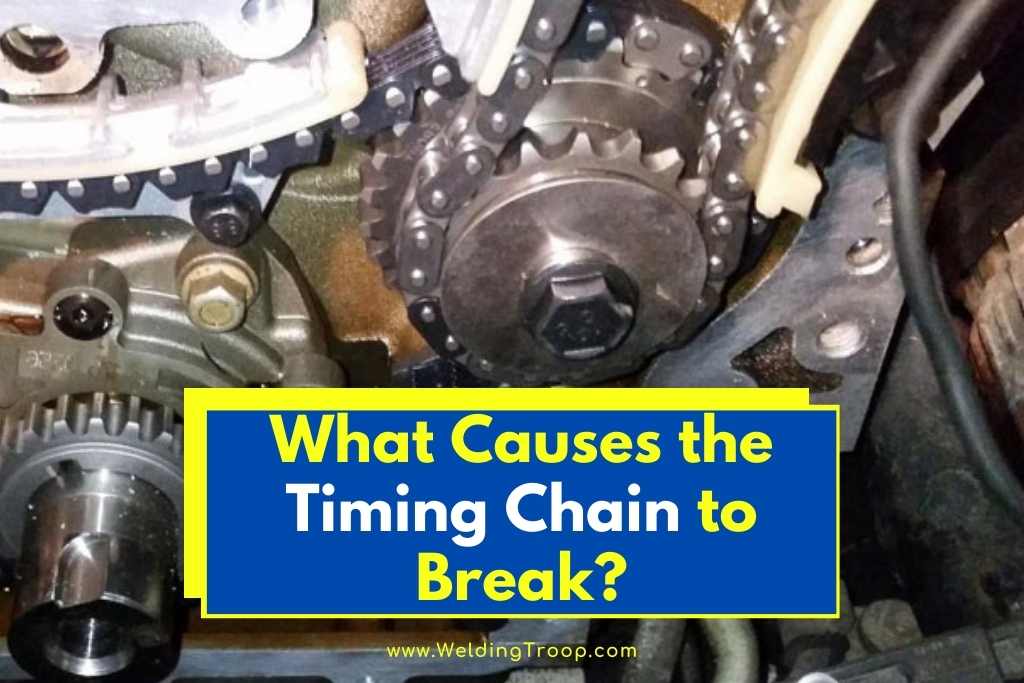If your timing chain breaks, it’s considered a critical failure—which means you’re out of luck, sitting on the side of the highway and waiting on a tow truck or a family member to come to pick you up.
Since a timing chain is something that is not supposed to break, what could cause it to do so anyway?
There are only four things that will typically cause a timing chain to break—not enough tension, too much tension, an engine seizure, or just the overall age of the timing chain.
A breaking timing chain should be a very rare occurrence. If you are replacing something in your car and have to remove and reinstall a new timing chain, it’s very important to make sure that it’s installed correctly.
Otherwise, you may end up on the side of the road somewhere.
Table of Contents
Timing Chain Tension
A timing chain has to have a nearly perfect amount of tension on it. Too much or too little will be the end of it.
Though they are called “chains,” they are actually made of durable rubber, and rubber will crack, fade, or snap if it isn’t properly handled.
Installing a timing chain too loose will cause a degree of flapping around as it struggles to keep the camshaft and the crankshaft in sync with one another.
The problem with all of that extra movement is it places undue strain on the timing chain. It will develop cracks.
Once cracks develop in rubber, it’s only a matter of time before they deepen, eventually turning into a clean cut, all the way through. Installing a timing chain too tight puts the chain under a lot of additional stress, which will cause cracks as well.
Either that or it will outright snap the timing chain when the stress pressure on the chain exceeds its weight tolerance.
These things are built to last well over 100,000 miles. If it snaps well before then, you can be sure that something was very wrong with it, to begin with.
A tension issue on a timing chain is one of the most common things that causes it to snap.
Engine Seizure
Another thing that will cause a timing chain to snap is something that might not be related to the timing chain at all.
If something causes your engine to seize up, it places a sudden, immense amount of pressure on the timing chain, often resulting in the chain snapping.
There are a lot of things that can cause an engine to seize up, most of which are completely preventable.
- Lack of engine oil
- Wrong engine oil
- The oil is burning off
- Failure to maintain the vehicle’s fluids
- Clogged oil filter
- Oil pump failure
- The engine is running hot
As you can see, the vast majority of the problems that cause engine seizures are oil-related. Without oil, or without the proper kind or amount of oil, a combustion engine can no longer properly lubricate itself.
All of those sliding, moving parts are no longer lubricated, specifically the pistons. Metal-on-metal contact, especially for a prolonged period, can cause engine failure, usually in the form of the engine seizing up.
Improper oil can cause the problem as well. If it’s too thick or too thin for the engine’s specs, it will fail to properly lubricate the moving parts.
You may even have an oil leak and not realize that your engine is no longer protected, especially on a long trip.
An overheating engine will cause it to seize up as well. This will often happen much quicker than problems with the oil.
If your electric fan goes belly up or you are leaking antifreeze, you might not notice that dial creeping up into the red until it’s too late.
Age
For the most part, vehicle manufacturers recommend that you have the timing chain swapped at around 60,000 miles. Timing chains are not invincible. They wear down with age, just like everything else does.
Most people don’t think to change their timing belts after only 60,000 miles. Besides, it’s generally a pretty expensive repair.
That’s mostly because so many parts have to come out to replace it, including the upper manifold, radiator, alternator, fans, water pumps, and all of the associated tubes and wires
When you go to the mechanic, 75% of that massive cost is in labor hours alone. A timing chain is pretty cheap after all and it can be a punishing task to try taking it on yourself, even if you are at a DIY level of mechanical inclination.
What are the Symptoms of a Failing Timing Chain?
A failing timing chain will present itself in a few ways. Fortunately, if a timing chain is starting to go bad, you will have ample warning before it finally breaks.
You don’t want a timing chain to break while you’re driving. If it does, it will likely damage far more than just the chain itself.
- The engine misfires as the chain is coming loose, causing the gears to skip
- A loose timing chain will often create a rattling sound, especially while idling
- There will be metal shavings in the oil pan
If you experience any one of these symptoms, you need to take the vehicle into the shop as soon as possible. With the exception of a misfire, a damaged timing chain may not trigger a “Check Engine Soon” light. You’ll simply have to pay attention to the symptoms presented.
You can always check the timing chain yourself but checking it is almost the same as changing it. To visually inspect a timing chain, you have to remove everything that’s covering it, which is usually quite a lot.
Occasionally, you’ll come across a vehicle where only the upper intake manifold is covering the timing chain but it’s rare.
Repair and Cost
Unless you are mechanically inclined, replacing the timing chain is one of the more difficult jobs to do under the hood.
There are worse jobs that require you to remove most of your dash inside the vehicle but the timing chain is almost always rough.
Replacing it is a precise thing as well. It’s a “timing” chain, after all, and you have to set the new one according to markers on the engine, according to your vehicle’s manual. Set the timing chain in the wrong way or off the marks will cause all sorts of problems and force you back to square one.
Taking it to the shop isn’t going to be cheap. The timing chain won’t cost much but the labor is intensive and will cost you around $80 to $120 per hour in just labor.
The average cost of having a mechanic replace the timing chain is $1750.
It’s a tricky replacement to do on your own and you might find that you want to replace other parts as you pull them and have a good look at them for the first time.
The average timing chain will cost between $80 and $200.
All Things Considered
Timing chains break when they are too loose, or too tight, the engine seizes up (for one reason or another), or the timing chain has just reached the end of its life expectancy.
It’s not the easiest DIY expense in the world but it is incredibly cost-effective as a mechanic will run you well over a thousand dollars.
References
https://itstillruns.com/causes-timing-chain-failures-7452887.html

